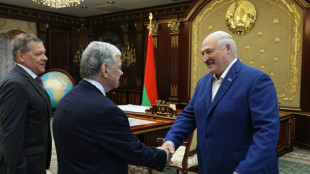South Korean workers head home after US raid stunned ally
Hundreds of South Koreans detained in a US immigration raid flew out on Thursday, after a stunned Soul warned that the "bewildering" episode could have a chilling effect on future investment.
South Koreans made up the majority of the 475 people arrested last week at a Hyundai-LG battery factory site in the state of Georgia, triggering a delicate effort to resolve the thorny situation between close allies.
A specially chartered Korean Air Boeing 747-8I plane was seen flying out of Atlanta after South Korea said it resolved the standoff. President Donald Trump's administration remained tight-lipped.
Photographs run by the Yonhap news agency showed the workers smiling and waving as they boarded buses after days in US detention.
South Korea is a staunch security ally and major investor for the United States, with its top companies pouring billions into developing factories and plants in America.
South Korean President Lee Jae Myung called the raid "bewildering" and noted it could have a chilling effect on future investment.
Lee blamed the raid on "cultural differences" saying that in South Korea, American nationals teaching English while on a tourist visa was not seen as "a serious issue".
After the detentions, South Korean companies "can't help but question whether setting up a plant in the US is worth the potential risks," Lee said.
"This could have a significant impact on future investment decisions, particularly when evaluating the feasibility of direct operations in the US," he added.
Many South Korean companies have relied on bringing in their own workforce during project development periods, with industry sources telling AFP it is common practice to use visa workarounds to bring in skilled labour and avoid project delays.
Lee said that for South Korean companies "when setting up facilities, equipment and factories, skilled technicians are essential."
"Someone has to install the machinery, and the necessary workforce simply doesn't exist locally in the US," he said, adding that the companies had long relied on bringing in their engineers for short-term periods to train local workers.
"But now, even that basic request is being rejected," he said.
Secretary of State Marco Rubio, meeting South Korea's Foreign Minister Cho Hyun on Wednesday, told him that the United States welcomed investment from Asia's fourth largest economy, according to the State Department.
- Handcuff shock -
Lee said Seoul was negotiating with Washington "to ensure that visa issuance for investment-related purposes operates normally."
This could include "securing additional quotas" or even creating a new visa category, he said, adding that he trusted the "US side will find a solution".
"But under the current circumstances, Korean companies will have little choice but to hesitate about making direct investments in the US," he added.
The operation was the largest single-site raid conducted since US President Donald Trump launched a sweeping immigration crackdown, a top political priority since he returned to office in January.
The raid came less than a month after Trump welcomed Lee to the White House.
Images of the South Korean workers being chained and handcuffed have caused widespread alarm, and Seoul has said it negotiated to make sure the workers were not handcuffed again as they were repatriated.
The raid highlights lopsided priorities in the Trump administration, which is "actively bringing in large-scale production facilities while neglecting to train local workers," said Kim Dae-jong, professor of business at Sejong University.
"As a result, South Koreans are having to train the local workforce. Logically, the two sides' workers should be allowed to work together, not be hindered from doing so," he told AFP.
But Cho Dong-geun, professor emeritus of economics at Myongji University warned that South Korean companies had long been aware of the visa problems.
"It is regrettable that there was no earlier intervention to address these matters in response to President Trump's anti-immigration agenda, as it should have been acted on more swiftly."
L.Bergmann--BVZ




